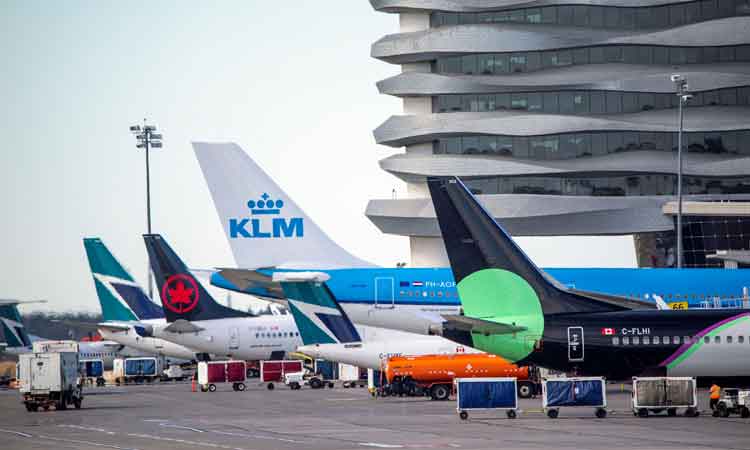The Cargo gateway to North America and beyond
- Like
- Digg
- Del
- Tumblr
- VKontakte
- Buffer
- Love This
- Odnoklassniki
- Meneame
- Blogger
- Amazon
- Yahoo Mail
- Gmail
- AOL
- Newsvine
- HackerNews
- Evernote
- MySpace
- Mail.ru
- Viadeo
- Line
- Comments
- Yummly
- SMS
- Viber
- Telegram
- Subscribe
- Skype
- Facebook Messenger
- Kakao
- LiveJournal
- Yammer
- Edgar
- Fintel
- Mix
- Instapaper
- Copy Link
Posted: 28 March 2023 | Mammen Tharakan | No comments yet
Mammen Tharakan, Director, E-Commerce, Cargo & Aviation Real Estate, Air Service & Business Development, at Edmonton International Airport (YEG), provides his insight into evolving cargo growth at the airport, its role geographically as a logistics hub and the sustainable initiatives that are shaping its future.


Edmonton, Alberta, Canada, is the largest northernmost city in North America. Its strategic location is rapidly being recognised internationally as a key multimodal global logistics hub and vital trade corridor for Canada.
Edmonton International Airport (YEG) is one the closest major North American airports to many parts of Asia by circumpolar routes. Interestingly, the Edmonton to Beijing flight path is one the shortest of any major city in North America, and there is only about nine minutes difference in flight time from Edmonton to Hong Kong or Shanghai compared to Vancouver.
As we look at using the earth’s curvature to improve supply chain efficiencies, the flight paths between YEG and many locations in Asia, Europe, the Middle East and Africa offer significant savings of time and distance.
YEG is also rapidly becoming a vital entry point into all of North America and Latin America. The Edmonton region is an inland port known as Port Alberta – where air, rail, pipelines and roadways converge within a Foreign Trade Zone.
Continuous cargo growth
From 2009-2019, cargo at YEG increased by 18%. Even during times of worldwide decreases in cargo volumes, our airport experienced a steady uptick in the movement of goods.
When the pandemic hit, passenger flights slowed, but cargo volumes accelerated. This was remarkable as there was a reduction of belly-cargo capacity associated with passenger flights. 2020-2021 were record-setting years, with cargo tonnage increasing by 13% over the pre-pandemic baseline. YEG became a critical hub in the movement of masks, medical supplies and vaccines and e-commerce.
Forward thinking, future ready
Years of planning prepared us to be ready, willing and able to handle increasing cargo demands, and when the pandemic hit, our airport was well prepared to facilitate the movement of essential goods.
We spent more than a decade strategising for air cargo development and investing in real estate to service increasing global supply chain demand. Our major focus was developing YEG’s Cargo Village to create a central hub to consolidate transport operations into one location.
Cargo Village has become a logistics utopia where businesses that provide various services within the transportation sector work in a collaborative ecosystem. This collaboration results in shorter transfer times and wait times and reduces handling while improving overall safety and quality of services.
YEG’s Cargo Village is also home to the cold storage Fresh Cargo Centre, a 465m2 facility with temperature control from +25°C to -90°C and direct airside access. YEG is the only airport community in Canada and the most northern airport in the world to be IATA CEIV certified, allowing us to meet the highest standards for handling perishables and temperature sensitive cargo.
Collaborate to innovate
YEG is blessed with the largest land area of any airport in Canada, allowing for extensive sprawling growth. Cargo Village is part of a large aerotropolis on YEG’s massive land mass, the Airport City Sustainability Campus.
Airport City is one of only two aerotropolis’ in Canada and has attracted CAN$1.5bn in investment over the past nine years. The campus currently houses an array of companies ranging from transportation, manufacturing, technology development, sustainability, tourism and hospitality.
Airport City is also a living lab for accelerating the development, testing, implementation and commercialisation of emerging clean technologies, including those used in the cargo and logistics industry. It is home to YEG’s hydrogen hub development, Canada’s first consumer-facing hydrogen hub, and is creating a model for decarbonising transportation and logistics.
Greening the future of air cargo
We know the air transport industry represents 2% of global emissions, and we have an important role in ensuring a positive future for our planet and people. Since the early 2000s, YEG has made it a mission to adopt sustainable initiatives throughout our airport, including cargo operations.
Over the past two decades, our airport has focused on being a first mover in many sustainability initiatives. Notably, we became the first airport in the world to sign The Climate Pledge. Led by Amazon, it includes more than 300 global businesses pledging to be carbon neutral by 2040.
In 2021, we signed the world’s first sustainability agreement between an airline and an airport. Together with Air Canada, we are focusing on initiatives promoting a cleaner environment, including electrification of aviation ground-handling equipment, hydrogen fuel cell technologies, green power generation, elimination of single-use plastic items and much more.
We are also Canada’s first airport to begin regularly scheduled drone delivery operations in a controlled airspace. Using zero-emission drones in final-mile delivery adds a new layer to cargo technology, reducing vehicle traffic and emissions.
Our airport recently became part of the inaugural cohort for TIACA’s BlueSky Program, a sustainability assessment, validation and verification scheme to track sustainability progress. We are also the first airport in the world to participate in the IATA Environmental Assessment (IEnvA) certification programme. Through this programme, IATA is partnering with us to develop sustainability standards for airports, guidance material and work toward becoming an even more sustainable organisation in everything we do.
Recently, we were recognised for these firsts and our extensive efforts to support innovation for a greener future, with two prestigious international awards: the Corporate Sustainability Award from The International Air Cargo Association (TIACA) and the Sustainability Award from Ground Handling International Magazine. These awards represent our collaborative efforts with other global partners as we move into the future of reducing our industry’s carbon footprint.
Next up: A massive cargo expansion
Construction recently finished on our new 47,000m2 cargo apron expansion. The apron can now hold up to six more widebody aircraft allowing more cargo to be handled at once. A new hydrant fuelling system is being installed on the apron and will tie into Shell Aviation’s two new, two million litre fuel tanks that were built for handling air cargo freighters. The hydrant fuelling system on the cargo apron will make operations safer, more efficient and better for the environment.
Our cold storage Fresh Cargo Centre is currently being expanded by 1,400m2. It will increase our cold storage capacity to nearly 2,000m2 and help us meet the demands for safely storing and transporting temperature sensitive goods.
Finally, a massive expansion to YEG’s cargo and logistics handling operations is set to break ground in 2023. The CAN$300m project will convert approximately 2,000 acres of land into an International Cargo Hub. It will be the largest cargo expansion in our airport’s history. Runway connections and taxiways will integrate new cargo handling aprons with direct airside handling operations. There will be expansive facilities for handling and warehousing and automated e-commerce logistics and distribution will be implemented.
The cargo expansion means YEG will advance our multimodal distribution throughout Canada and North America. It will help position Canada’s leadership in global supply chains and place us as a top player in meeting the demands of the rapidly growing worldwide e-commerce and import/export fulfilment needs. YEG knows that our lofty goals cannot be completed alone. We are eager for opportunities to collaborate, partner and share knowledge with others in the industry.
The vast advantages of Edmonton International Airport are the talk of the cargo community. Beyond being the gateway to North America, we are ready, willing and able to be global leaders in innovative cargo solutions that provide a sustainable future for our industry.


Issue
Related topics
Air freight and cargo, Airport development, Sustainability, Sustainable development


















